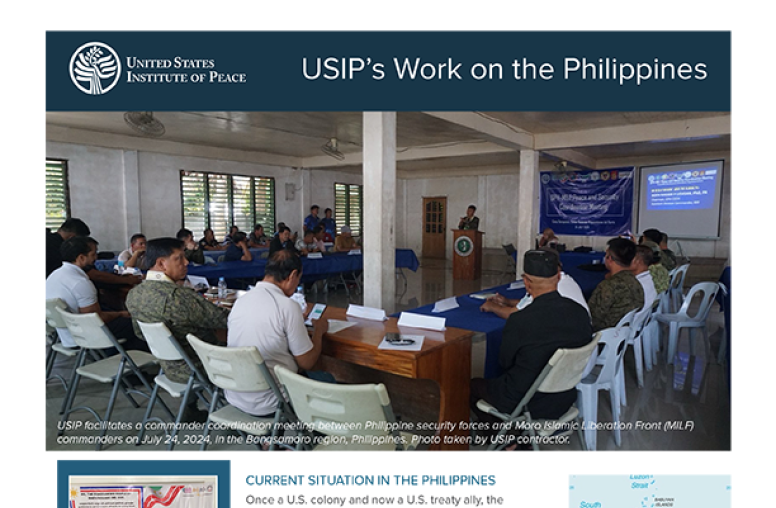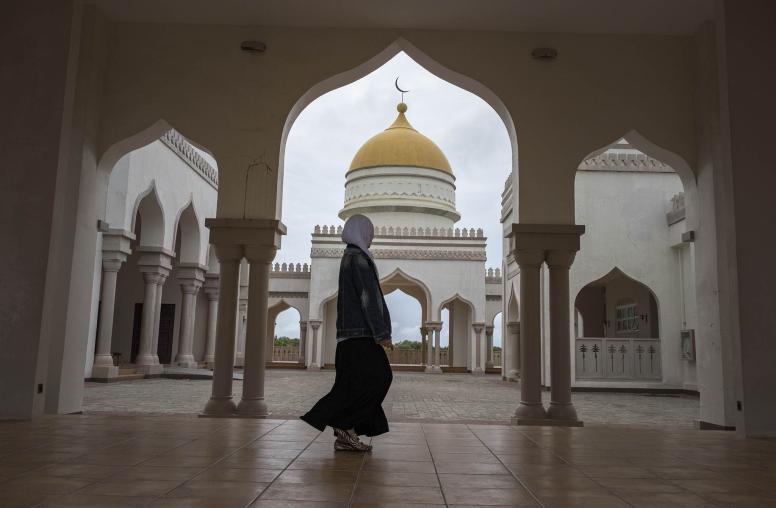The Philippines’ Bangsamoro Transition Authority’s Expectation Management Challenge
Slow implementation of the normalization track of the peace process is a major source of disappointment.
Editor’s Note: A crucial component of the success of any peace process is winning the support of local populations. This was particularly important in the southern Philippines where the progression of recent peace efforts depended on the result of the 2019 plebiscite. After decades of war and endemic poverty, expectations are high for what the peace dividend will deliver in socioeconomic, education, security, infrastructure and political reforms. The Bangsamoro Transition Authority’s (BTA’s) expectation management challenge may prove decisive in maintaining popular commitment to the peace process. The Bangsamoro Information Office (BIO) has a central role to play in these efforts.

In this article, the executive director of the BIO, Ameen Andrew Alonto, outlines some of the major challenges that confront the BTA and the role of expectation management in achieving sustainable peace.
The establishment of the Bangsamoro Autonomous Region in Muslim Mindanao (BARMM) in 2019 renewed the hopes of the minority Muslims in the southern Philippines. Finally, after 17 long years of formal negotiations between the Philippine government and the Moro Islamic Liberation Front (MILF), faith in achieving lasting peace and progress was fortified. If we are to assess the expectations of the people since the signing of the Comprehensive Agreement on the Bangsamoro (CAB) in 2014, we must first understand that the peace agreement is composed of two tracks. There is the political track that involves the passage of an Organic Law to establish a new government, and then there is the normalization track that includes the decommissioning of MILF combatants and their weapons, along with the transformation of their camps into productive communities. Further integrated in this track is the disbandment of other private armed groups in the region.
The MILF-led Bangsamoro Transition Authority (BTA), the interim government of the BARMM, introduced “moral governance.” This system of governance “refers to the set of rules, practices, and processes completely devoid of all the evils of graft and corruption, and explicitly driven by the moral principles of utmost dedication, devotion, honesty, justice, and integrity.” Transitioning from a government that had been marred by allegations of malpractice, the people were quick to embrace “moral governance” as a guiding principle — an antidote to the evils in governance. As the Bangsamoro government enters its third year, we may not be so bold as to claim that all people are fully satisfied with its performance. But, as with all governments that are still in their formative years, the Bangsamoro government has overcome major challenges made even more difficult by the pandemic.
A Rocky Start to the Political-Legal Track
When the BARMM was established in March 2019, it was subject to several limitations that have affected the transition. First, the BARMM inherited the remaining budget of its predecessor, the Autonomous Region in Muslim Mindanao (ARMM). The Bangsamoro government was legally obliged to disburse or use the remaining funds in accordance with what was planned out by the ARMM. In other words, the new government was not afforded ample space to introduce new programs and projects during its first year.
It was also during that same year that the process of phasing out old employees of the ARMM was put into effect pursuant to Republic Act (RA) 11054. This law, which created the BARMM, provides that there shall be a “gradual phasing out of offices of the Autonomous Regional Government in Muslim Mindanao, which are deemed abolished upon the ratification of this Organic Law.” This provision in the law alone was a major setback for the people’s expectations of the BTA. There was resistance because being phased out meant losing one’s source of income for their family. However, this phasing out was not done without due process or proper regard to the employees’ situation. ARMM employees who were affected by the phasing out process were entitled to substantial benefits, which have been provided. Consultations and dialogue between the ARMM employees and the new BARMM executive management were held before the process was undertaken. There was a discussion about the need to phase out old employees if genuine change in governance was to be attained.
With the phasing out of old ARMM employees came the phasing in of new BARMM employees. To ensure that all interested and qualified applicants could apply, the Bangsamoro government launched a job portal to provide equal opportunities to all job hopefuls from across the country. Among the many advantages of this approach is that it allows for online applications, enabling those from distant islands to apply for new government positions. At the time of writing, 6,156 jobs had been posted on the job portal and had received a total of 456,572 applications. However, the recruitment process has disappointed many as there are simply not enough government jobs for all the qualified applicants. It is also worth mentioning that the vision for the Bangsamoro government is not to be a mere employment agency, but rather an institution that provides high-quality public service.
Obstacles to Normalization
The slow implementation of the normalization track, a critical aspect of the peace process, is a major source of disappointment. The normalization track has eight interrelated components: creation of the transitional components of normalization — Joint Normalization Committee, Joint Peace and Security Committee and Joint Peace and Security Teams; socioeconomic development program; confidence-building measures, such as pardon and amnesty, as well as special programs for the six acknowledged camps of the MILF; decommissioning of MILF weapons and combatants; redeployment of Armed Forces of the Philippines in the Bangsamoro; policing in the Bangsamoro; disbanding of private armed groups; and transitional justice and reconciliation program. The requirements and milestones for the completion of the normalization track were first developed during the negotiations between the government of the Philippines and the MILF. The Annex on Normalization, the CAB’s last annex which was signed on January 25, 2014, outlines the process of transforming MILF combatants to becoming civilians and productive members of society, and aims to ensure the proper environment for such a process.
Several issues have emerged during implementation. For example, the decommissioning of the 40,000 MILF combatants and their weapons is only halfway complete three years into the process. These issues are largely due to problems with implementation falling short of what was intended or promised in the law. For example, establishing a policing capacity in the Bangsamoro, another agreement in the CAB, never happened as provisions related to this were stricken out by Philippine legislators during deliberations on RA 11054 of the Bangsamoro Organic Law. Moreover, the COVID-19 pandemic caused significant delays in the implementation of various programs and projects in the political and normalization tracks. Lockdowns and the shifting of resources to respond to the pandemic hampered the delivery of services and focus on implementing the peace agreement.
Communication Is Crucial
In retrospect, expectations of the Bangsamoro authorities were very high at the signing of the CAB. These high expectations came not only from the Bangsamoro communities, but also from the rest of the country and the international community. For the Bangsamoro government, the pressure was on from the start. The key to managing these expectations is understanding the various audiences and knowing the appropriate approach to adopt when communicating with them.
The Bangsamoro government, through the Bangsamoro Information Office and its ministries, has embraced digital platforms to inform the public of its accomplishments and milestones. However, gaps have emerged due to the challenge of communicating to communities with poor or no internet service. These services need to be improved, but this takes time. In a post-conflict setting like the Bangsamoro, meeting or managing the public’s expectations is crucial if we want to sustain the peace that we have gained so far.
It is for this reason that the Bangsamoro government has been engaging with civil society organizations (CSOs) to help them act as messengers to their communities at the grassroots level. In January 2021, BARMM Chief Minister Ahod Ebrahim held the first ever mushawara, a dialogue with CSOs aimed at strengthening their participation in governance. Through that platform, the Office of the Chief Minister received direct and firsthand information about the communities’ concerns. Moreover, the Bangsamoro government has been collaborating with several development partners to enhance the capacity of information and communication officers in the region through lectures and workshops conducted by experts.
The people in the Bangsamoro have long suffered from neglect, corruption and conflict. While the Bangsamoro government is doing everything it can to deliver results, it should also simultaneously make the people understand that transitioning from a conflict-ridden region to a peaceful and productive society takes time. That time may extend beyond the transition period, but it will be worth it.



